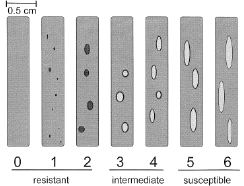FOUR GENES, GREATER RESISTANCE: RICE VARIETIES SUITABLE FOR TEMPERATE CLIMATES AND TOLERANT TO RICE BLAST
A major issue in rice production is the control of Pyricularia oryzae, the causal agent of rice blast. Genotypes with R resistant leucine-rich repeat (LRR) genes control specific races of the parasite. Such resistance is overcome by the pathogen, provided a long enough time. In temperate areas, current cultivated varieties show a largely insufficient field resistance. This prompted us to undertake the pyramiding of the R resistance genes Pib, Piz, Pik, Pita2, and Piz-t. The lines that we produced (SJKK and SJKT), have each four pyramidized genes. They are fully resistant to rice blast when tested in the field and in the greenhouse. Notably, the partly tropical origin of the R donor genotypes added complexity to the pyramiding exercise. Our findings point to a lack of fitness costs in pyramidized lines.
Figure: schematic representation of the lesions induced by brusone on resistant, intermediate and susceptible rice genotype leaves.
REFERENCE
Gabriele Orasen, Raffaella Greco, Enrico Puja, Carlo Pozzi & Maria Rosaria Stile (2020) Blast resistance R genes pyramiding in temperate japonica rice. Euphytica, 216, 3. [Doi: 10.1007/s10681-020-2575-2]

